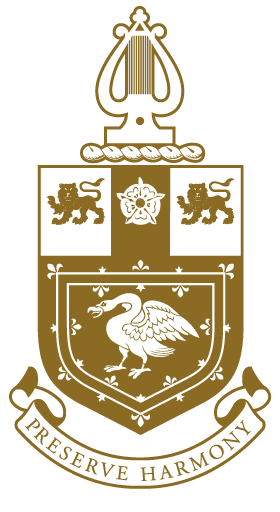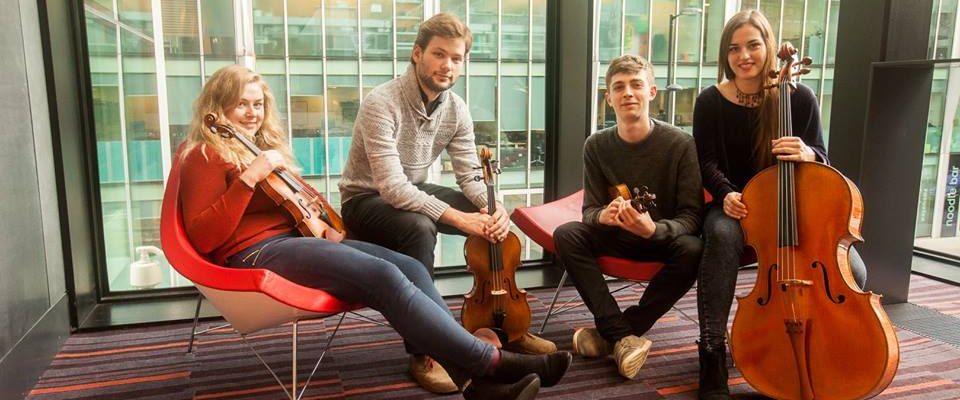#MiddayMusic presents Ibex Brass (brass dectet) and Oliver Wass (harp)
This week our Young Artists Ibex Brass (brass dectet) and Oliver Wass (harp) performed for #MiddayMusic. You can watch their videos below. Subscribe to our YouTube channel to catch Dimitrios Soukaras (guitar) perform next Monday and Antonina Suhanova (piano) perform next Wednesday, both at midday. Details of their repertoire can be found in the details section on YouTube. All of our #MiddayMusic videos can be watched on our exclusive playlist.
Ibex Brass: United by friendship and music
Ibex Brass is an award-winning 10-piece ensemble with a passion to expand the existing brass repertoire, often giving well-known classics a brassy new sheen.
United by friendship and music, group trumpeter Bradley Jones says, “One of the things that’s so great about our group is that we’re close friends, so when everything was cancelled, it was disappointing not to be able to meet up for rehearsals and concerts. What has been lovely, though, is making our video for the Musicians’ Company #MiddayMusic series. When you see the video with everyone playing together it really fills you with an incredible mix of emotions.”
While the technology isn’t quite advanced enough for members to have a big Zoom call and play pieces together, individual members have been involved in live virtual performances with Brass on the Bus, Rio Brass, Southbank Sinfonia, Connaught Brass and more. The group has also begun work on new arrangements of Strauss, Puccini, and Barber that they hope to premiere next year.
For the #MiddayMusic series the group has recorded the final two movements of Ravel’s Le Tombeau de Couperin, arranged for brass dectet by group trombonist, William Foster. Aside from group personal favourites, the pieces resonate with current times.
William says, “Le Tombeau de Couperin was written by Ravel as a homage to friends and colleagues who died in the First World War. Crucially, however, the music of the suite transcends this tragic context, and Ravel chose to commemorate his fallen friends with some of his most beautiful, elegant, and indeed innocent music. This makes the music particularly relevant today: despite what is going on around us, music still has the capacity to transcend its environment, and transport us to somewhere wholly devoid of tragedy and anguish.”
Oliver Wass: Skilling up during lockdown
“Playing harp is the family trade,” says Oliver, but it was self-determination rather than family persuasion than led him to become a professional harpist. “My mum actually wanted me to be an accountant or similar, or at least to marry one!”.
Where Oliver would normally be doing the round of summer festivals, travelling from London to venues across the UK and even to Poland to record a CD, this summer his work involves teaching and performing pre-recorded and online recitals for organisations including Salvi Harps, the Musicians’ Company and Bristol Arts Channel.
Oliver has also been getting to grips with video editing software. “I had a few hiccups to begin, such as trying to stream at Ultra HD resolution using a low-res web cam, but it’s been a good thing to learn. I’ve also been finalising edits for the release of a debut CD with my trio, The Pelléas Ensemble.” The CD includes works by Bax Elegiac Trio and Sonata After Syrinx by Richard Rodney Bennett.
Oliver’s first live performance will be in November at the Presteigne Festival in Wales, and he will release more information about this on his website and via his regular newsletter.
For Oliver’s #MiddayMusic pieces, he has chosen Tarrega’s Recuerdos de la Alhambra (originally for guitar), which requires a completely new technique to produce the right hand tremolo on the harp. He also performs two pastiches, À la manière de Chabrier and À la manière de Borodine for their respective charm and gentle wistfulness.





